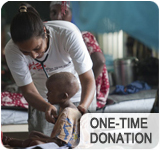Easy options:

- Donate to the Susan G. Komen for the Cure fund for breast cancer research: Breastcancer or buy merchandise from the foundation. The proceeds will fund breast cancer research: Komen . You can also text “KOMEN” to 90999 to donate $10
- Donate to the Leukemia and Lymphoma Society by phone or online: Leukemia . You can also buy merchandise from the society: Leukemiashop , the proceeds of which will, of course, go towards Leukemia and Lymphoma research
- Buy a UNICEF inspired gift related to medical care or vaccination: UNICEF. You can also simply donate to UNICEF, which provides vaccinations and medical treatment to impoverished children: UNICEFmed
- Donate blood: Blood . There are blood donation centers around the country, and there are often at-school blood drives.
- Donate to the American Association for Cancer Research: AACR
- Get involved in the “Race for the Cure” for breast cancer: Raceforthecure
- Participate in a “walk-a-thon” for any number of diseases in your neighborhood
- Donate to the PACER Center for children with disabilities: Pacer
- Donate to the Arc for People with Intellectual and Developmental disabilities: Arc
Issue: Medical Care

When we go to the doctor, get shots, or go to the hospital, we rarely think of ourselves as privileged. For much of the world, however, the basic right of medical care is completely absent or is vastly inadequate. Even in places where medical care is taken for granted, there are many diseases for which the cure remains elusive. The consequence of both these factors is that even in the twenty-first century, disease is a major cause of death, not only among the elderly, but among all sectors of the population, including children. In response, the world has begun to band together to find cures and to bring existing cures into poor and undeveloped areas. Everyone can join in this noble fight against disease!
Note: while cognitive and physical disabilities are not necessarily life-threatening, people with such disabilities experience related medical problems, discrimination, and are often vulnerable to abuse and poverty. There are a number of charitable organizations devoted to helping improve the quality of life for those with disabilities.
For more information:
Long-term options:

- Volunteer with the Red Cross: RCvol
- Start your own walk or run to raise money for medical research or for increasing the availability of medical care in poor and underdeveloped areas
- Start a blood drive in your school
- Organize a “day of health” where medical professionals provide free medical care/evaluations for a day
- Volunteer at a free care clinic
- Volunteer to help with Special Olympics
- Volunteer at Doctors without Borders
- Tutor or be a “buddy” to students with disabilities
- Start a “buddy” program for students with disabilities in your school
- Start a club to raise money for medical research and/or distribution of medicine in poor areas. You can organize any kind of fund/awareness-raising activities such as movies, concerts, charity runs, bake sales, dances, ice cream socials, fundraising competitions at local schools, or any other activity that you think would generate interest in your community. You could also collect donations or matching funds from businesses and community organizations.
- Volunteer with the PACER center for children with disabilities: Pacervol
 When we go to the doctor, get shots, or go to the hospital, we rarely think of ourselves as privileged. For much of the world, however, the basic right of medical care is completely absent or is vastly inadequate. Even in places where medical care is taken for granted, there are many diseases for which the cure remains elusive. The consequence of both these factors is that even in the twenty-first century, disease is a major cause of death, not only among the elderly, but among all sectors of the population, including children. In response, the world has begun to band together to find cures and to bring existing cures into poor and undeveloped areas. Everyone can join in this noble fight against disease!
Note: while cognitive and physical disabilities are not necessarily life-threatening, people with such disabilities experience related medical problems, discrimination, and are often vulnerable to abuse and poverty. There are a number of charitable organizations devoted to helping improve the quality of life for those with disabilities.
When we go to the doctor, get shots, or go to the hospital, we rarely think of ourselves as privileged. For much of the world, however, the basic right of medical care is completely absent or is vastly inadequate. Even in places where medical care is taken for granted, there are many diseases for which the cure remains elusive. The consequence of both these factors is that even in the twenty-first century, disease is a major cause of death, not only among the elderly, but among all sectors of the population, including children. In response, the world has begun to band together to find cures and to bring existing cures into poor and undeveloped areas. Everyone can join in this noble fight against disease!
Note: while cognitive and physical disabilities are not necessarily life-threatening, people with such disabilities experience related medical problems, discrimination, and are often vulnerable to abuse and poverty. There are a number of charitable organizations devoted to helping improve the quality of life for those with disabilities.

